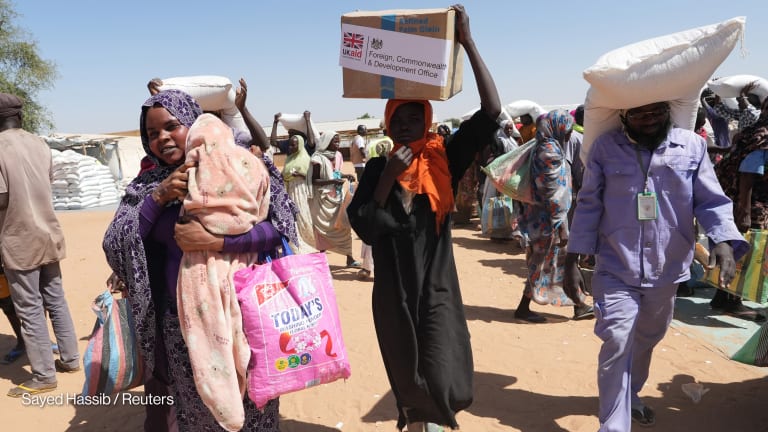
LONDON — The United Kingdom’s future aid strategy will focus only on countries in which its “development, security, and economic interests align,” according to Foreign Secretary Dominic Raab.
Raab announced the U.K. will be following a “new strategic framework for ODA [official development assistance] that will replace the government’s 2015 aid strategy.” The announcement was made in a letter to Sarah Champion, chair of the International Development Committee — the cross-party body responsible for scrutinizing government aid policy.
The letter outlines the development policy areas the government will be focusing on in future, and revealed significant planned changes to how the Foreign, Commonwealth and Development Office manages aid projects. “Failing or underperforming projects … [will be] weeded out and closed,” the letter notes.
The department will also decide the final allocation of aid funding to other government departments and will control — in spending or allocation — 93.5% of all U.K. aid. The move is significant as aid spending by departments other than the Department for International Development, the aid-focused predecessor department to FCDO, was often accused of being of poor quality and attracting negative attention toward development.
“The reforms will make aid more effective,” wrote Raab. The letter was published by the committee soon after Chancellor Rishi Sunak confirmed that there would be a “temporary” reduction to the aid budget tied to 0.7% of gross national income next year. The U.K. will instead spend 0.5% of GNI on ODA until “the fiscal situation allows” a budget increase.
Regions in which the U.K. has development, security, and economic interests include sub-Saharan Africa and the Indo-Pacific, according to Raab. All U.K. ODA will in future be focused on seven “global challenges where the U.K. can make the most difference.”
“The U.K. will remain the largest donor to the World Bank and a major donor to the World Health Organisation in order to help shape global development.”
— Dominic Raab, U.K. foreign secretaryMost of the seven focus areas were protected from spending cuts announced in July, although poverty reduction for the “bottom billion,” identified as a priority area in July, was noticeably missing from the new list. The seven focus areas include climate change and biodiversity, including investing in research and science; COVID-19 and global health security, through multilateral initiatives and organizations and “supporting fragile health systems”; girls education; science, research, and technology, including “leveraging global science partnerships;” open societies and conflict resolution; and trade and economic development, which would include investment from U.K. Export Finance as well as CDC Group.
The last focus area is humanitarian preparedness and response, which includes “reforming the international humanitarian system” and “maintaining a minimum FCDO crisis aid reserve.”
The U.K.’s core investment in multilateral development banks will also be based on its new strategic objectives, according to the letter, though it stressed that: “The U.K. will remain the largest donor to the World Bank and a major donor to the World Health Organisation in order to help shape global development.”
In the letter, Raab noted that he is “determined to get the best impact for the money we spend.” He said “too often, aid has lacked coherence, oversight or appropriate accountability across Whitehall.”
There will be a new FCDO-led management process to assess aid projects which will be judged against the strategic objectives, their impact, and value for money. Heads of missions overseas will provide advice on their likely effectiveness, and bilateral programs will be the “default” choice.
There will also be changes for suppliers. Raab said “restrictive and outdated” spending limits that forced DFID to “outsource work to expensive consultants” will be replaced. “I believe a genuine choice of delivery mechanisms, rather than reliance on mega contracts with delivery agents, will deliver better results,” the foreign secretary wrote.
The new approach was broadly welcomed by Ranil Dissanayake, policy fellow at the Center for Global Development, who said it was “excellent” and similar to his proposals for making the most effective use out of the cuts — though he worried the emphasis on science partnerships would mean retaining the Newton Fund and Global Challenges Research Fund, which have received criticism for not addressing development sufficiently.
It would be a positive step for funds to be administered through FCDO “since they have excellent, tight procurement processes and are really good at holding suppliers to account on development impact,” Dissanayake said.
But he added: “It remains to be seen how well these good intentions are translated into action.”
Update, Nov. 26: This story was updated to include additional detail.
Search for articles
Most Read
- 1
- 2
- 3
- 4
- 5








